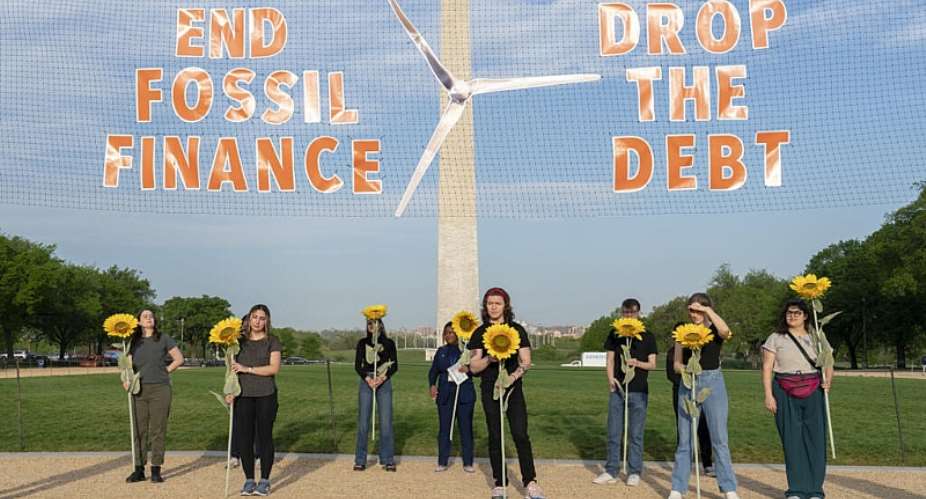The urgent issues of climate financing and global inequality will underpin this week's spring meetings of the World Bank and the International Monetary Fund – coming amid growing calls for a shake-up of those institutions to avoid a climate-driven “economic catastrophe”.
The debt burden on developing countries, most of which are suffering disproportionate climate shocks, is an issue that's gained traction at successive climate talks – with a Loss and Damages Fund hailed as a major success at last year's Cop28 conference in Dubai.
Finding the trillions of dollars needed for broader climate finance is a challenging question that will be addressed at the Washington meetings, which come as the World Bank and IMF – the Bretton Woods institutions – mark 80 years of promoting international monetary cooperation.
Created by 44 Allied nations in the aftermath of World War II to prevent the sort of economic instability that contributed to the Great Depression as well as the war, the institutions are now tasked with modernising themselves as fresh challenges threaten the global economy.
'Quantum leap'
The head of the UNFCCC climate body, Simon Stiell, last week warned that a “quantum leap” in climate finance was needed to avoid a scenario in which the world's economy is brought to a devastating halt.
Without this revolutionary progress, he said, many countries will be unable to implement strong new climate plans in early 2025, when the next round of NDCs (Nationally Determined Contributions) is due.
“It's hard for any government to invest in renewables or climate resilience when the treasury coffers are bare, debt servicing costs have overtaken health spending, new borrowing is impossible and the wolves of poverty are at the door,” Stiell said in a speech at London's Chatham House think tank.
Climate finance traditionally means rich nations and multilateral development banks allocating money – drawn from public, private and alternative sources – to developing countries to help them cut emissions and adapt to climate change.
The World Bank, which was chosen to manage the Loss and Damages Fund, and the IMF will be instrumental in determining whether poorer nations can access the finance they need.
“That's why the collaboration of the IMF and multilateral development banks is so important,” former French diplomat Laurence Tubiana, now chair of the European Climate Foundation, told a recent press conference.
Ensuring poorer countries have speedy access to debt-free financing was crucial, she added.
Fresh tactics
Both the IMF and World Bank have sought to draw in private capital at much higher levels because donations from wealthy nations will never be able to cover the burgeoning cost of the climate crisis.
At Cop28, the World Bank set itself an objective to devote 45 percent of its financing to climate-related projects by 2025. To make that happen, president Ajay Banga is calling on the private sector.
The institution has estimated that developing countries will need about $2.4 trillion each year between now and 2030 in order to meet challenges that include conflict and pandemics as well as climate change.
Steill urged the World Bank to step up the pace on climate finance solutions – including by looking at alternative funding sources such as a levy on frequent flyers and taxing shipping emissions.
Internal change
An overall reform of development banks was crucial, he said, such as changing their lending practices to allow for debt relief.
Steill called for a new target that meets the needs of developing countries to be agreed at the Cop29 climate talks in Baku later this year – where financing for energy transition and climate adaptation will be central themes – before adding that this too would fall short.
“It's not enough to agree a target. We need a new deal on climate finance between developed and developing countries,” Stiell said.
“The spring meetings are not a dress rehearsal. Averting a climate-driven economic catastrophe is core business. It can't slip between the cracks of different mandates.”





 ‘Fools have infiltrated NPP; it's no more attractive’ — A Plus
‘Fools have infiltrated NPP; it's no more attractive’ — A Plus
 VIDEO: ‘Nana esisi y3n, Bawumia adi y3n awu’ – Woman composes song calling on Gh...
VIDEO: ‘Nana esisi y3n, Bawumia adi y3n awu’ – Woman composes song calling on Gh...
 They’re false accusations; check all bank accounts — Agya Koo ‘denies’ being ric...
They’re false accusations; check all bank accounts — Agya Koo ‘denies’ being ric...
 Over 40 health structures completed, 26 facilities outside agenda 111 under cons...
Over 40 health structures completed, 26 facilities outside agenda 111 under cons...
 I nearly committed suicide after my public HIV test was positive — Former AIDS A...
I nearly committed suicide after my public HIV test was positive — Former AIDS A...
 Gov’t committed to retooling Ghana Navy, Armed Forces – Akufo-Addo assures
Gov’t committed to retooling Ghana Navy, Armed Forces – Akufo-Addo assures
 Stand and greet me: Akufo-Addo behaving like a child with inferiority complex — ...
Stand and greet me: Akufo-Addo behaving like a child with inferiority complex — ...
 Mahama destroyed the ‘meaty’ better Ghana and built a ‘bony’ Ghana; we don’t wan...
Mahama destroyed the ‘meaty’ better Ghana and built a ‘bony’ Ghana; we don’t wan...
 We won’t hesitate to sanction officials who violate our laws – EC warns official...
We won’t hesitate to sanction officials who violate our laws – EC warns official...
 Proposed nationwide rebranding of Public Basic Schools is a misplaced priority –...
Proposed nationwide rebranding of Public Basic Schools is a misplaced priority –...
